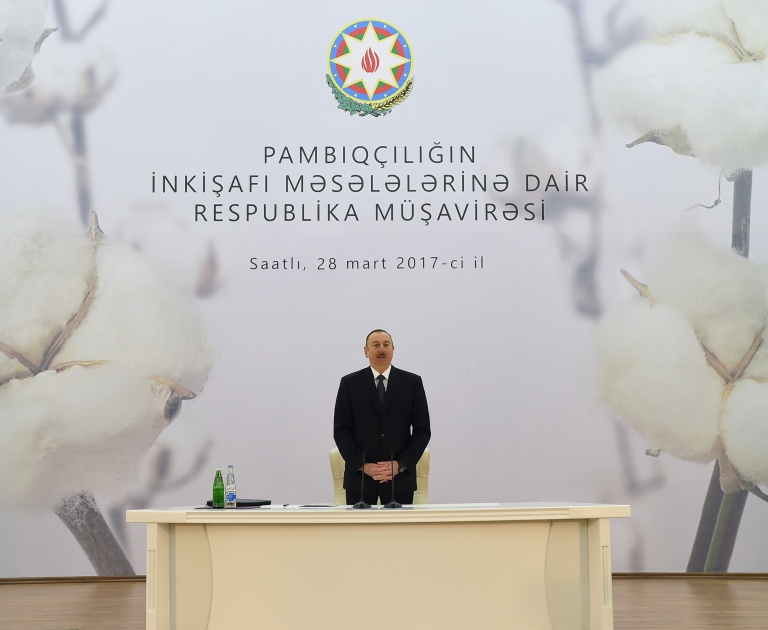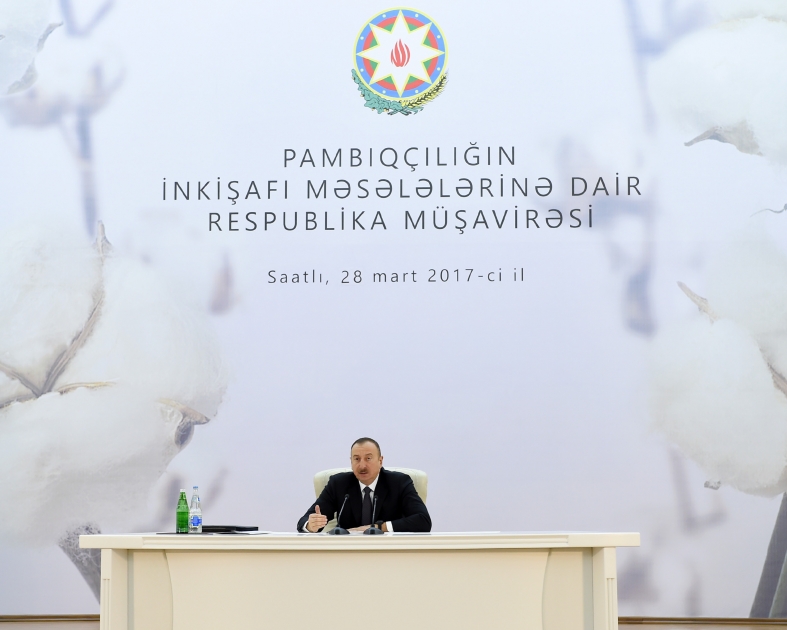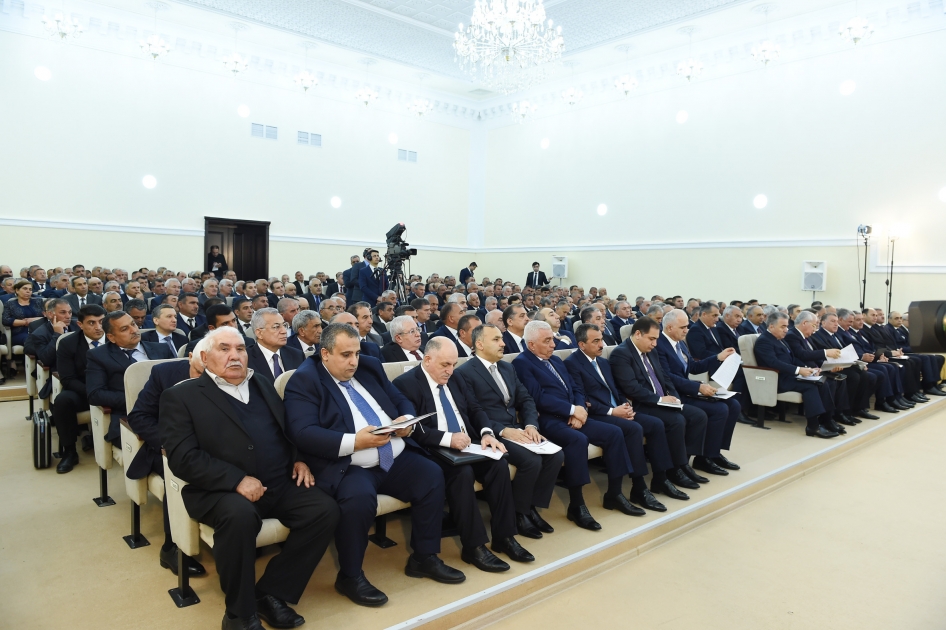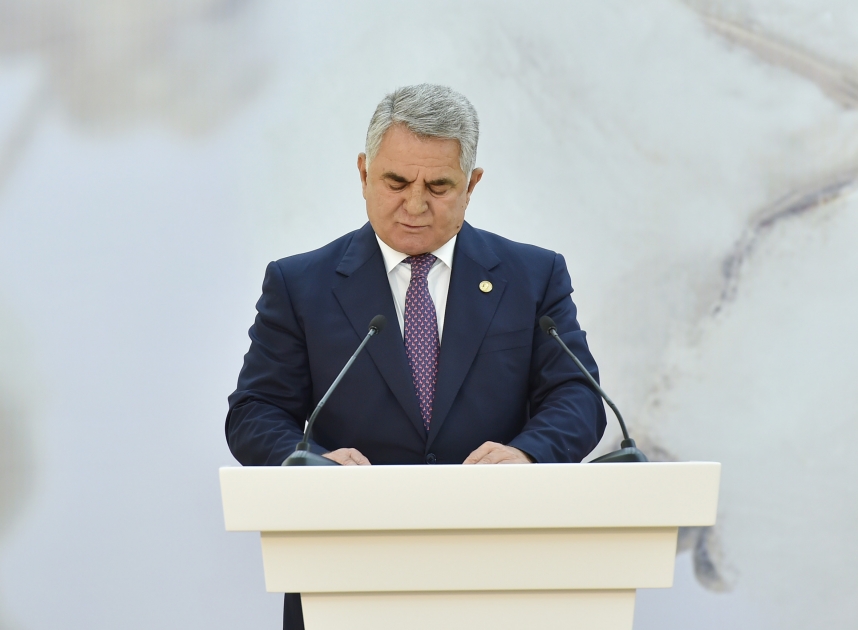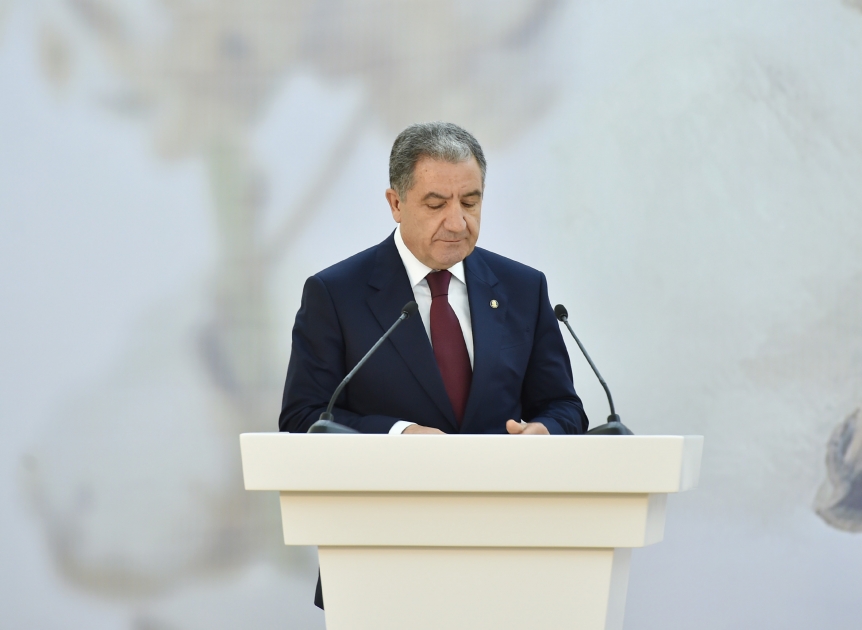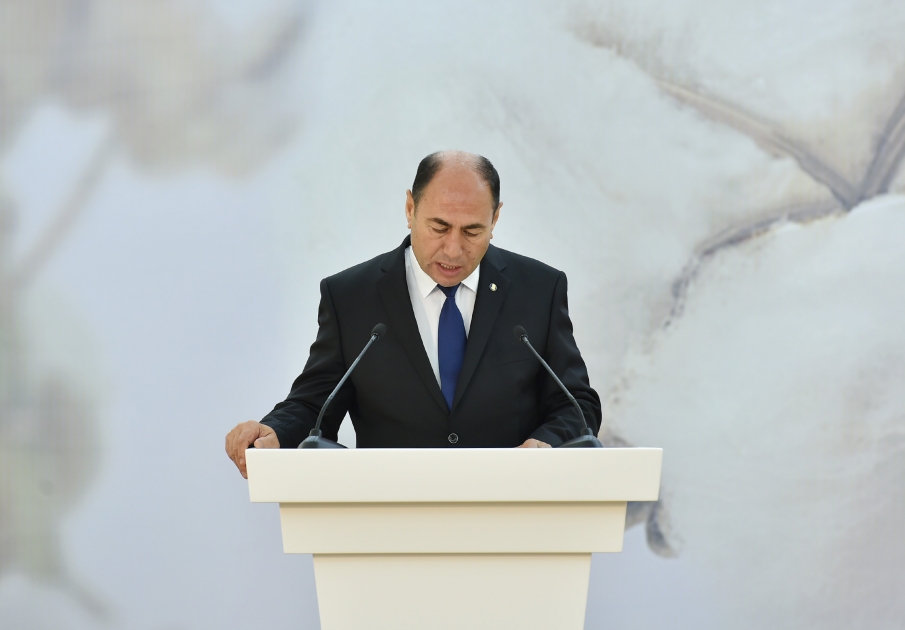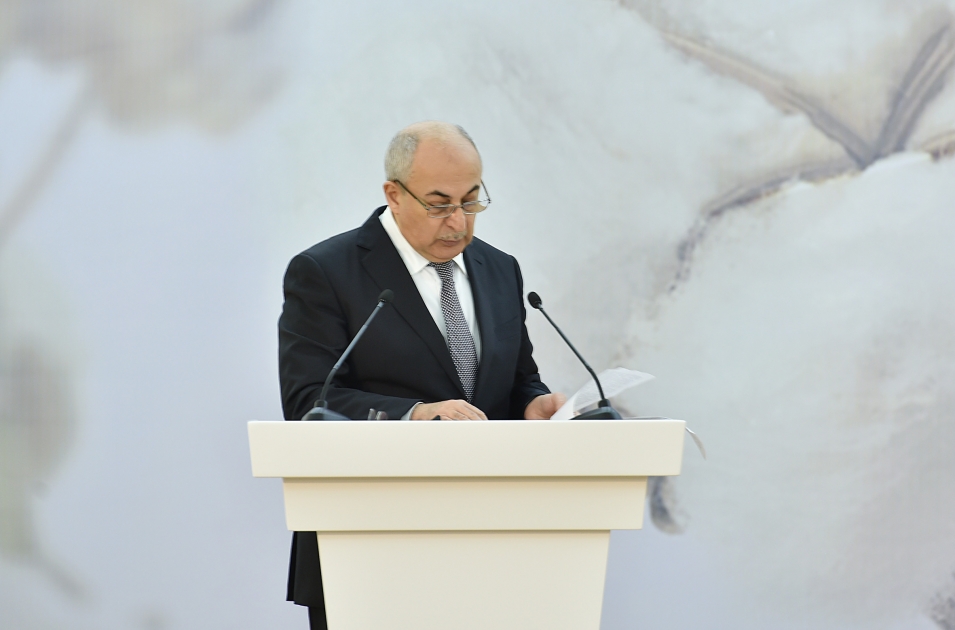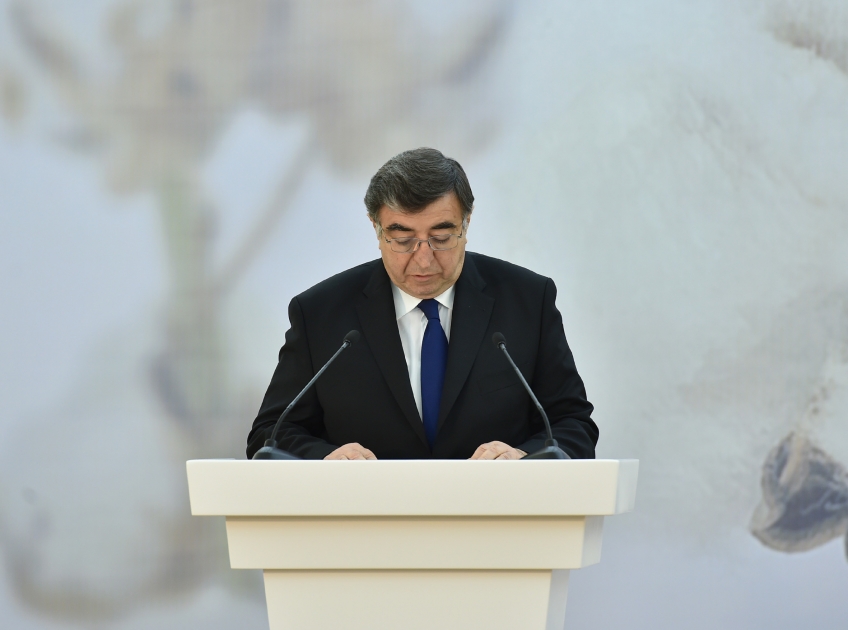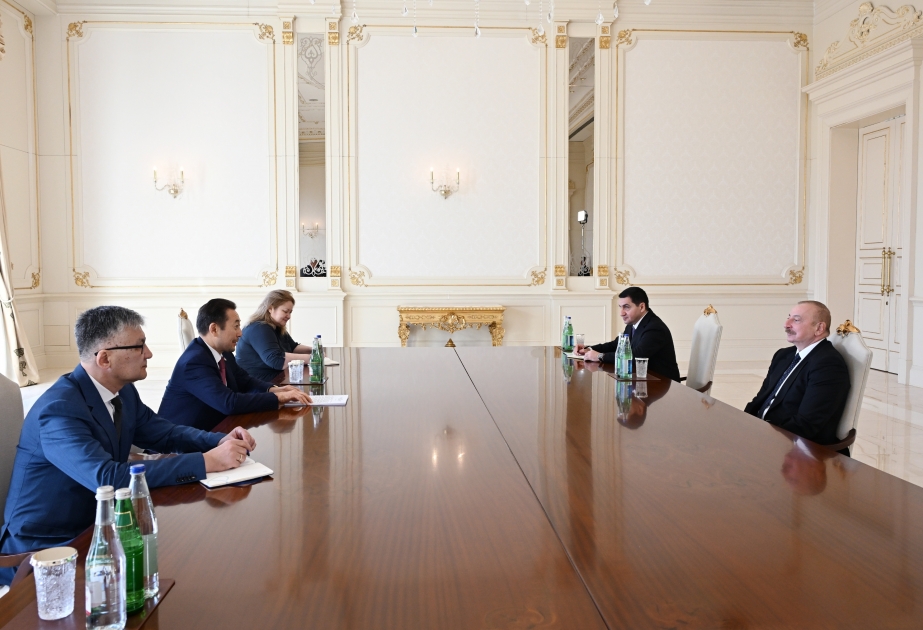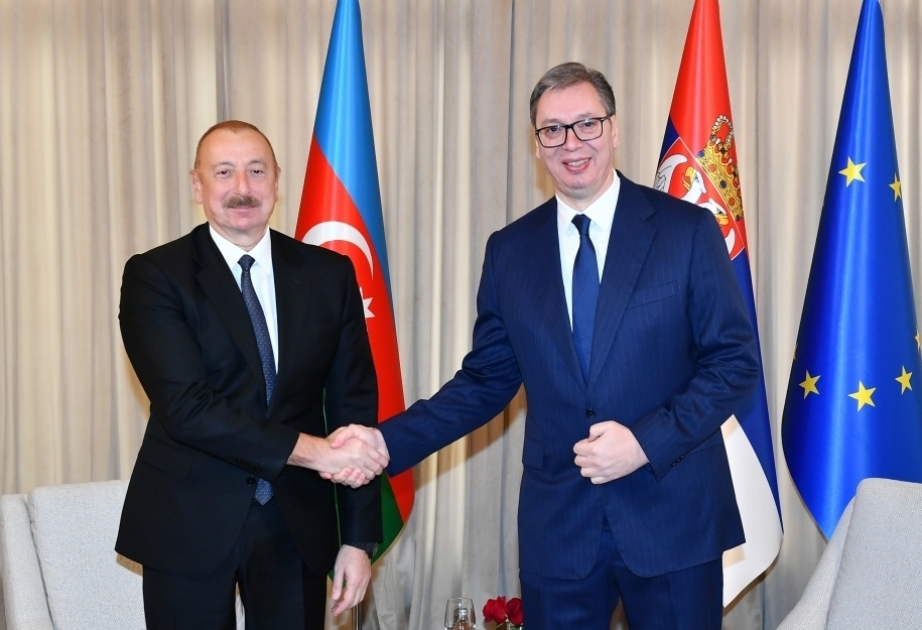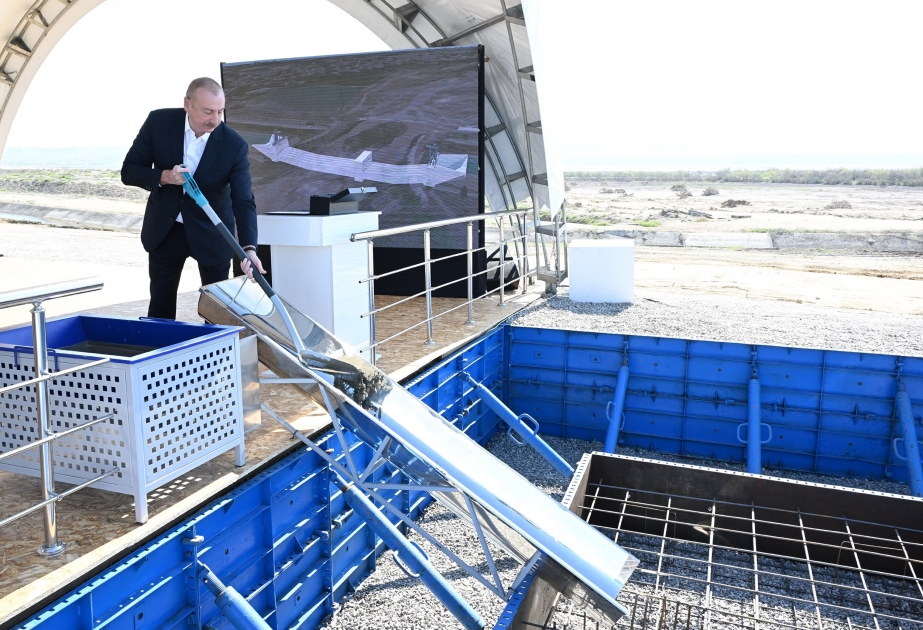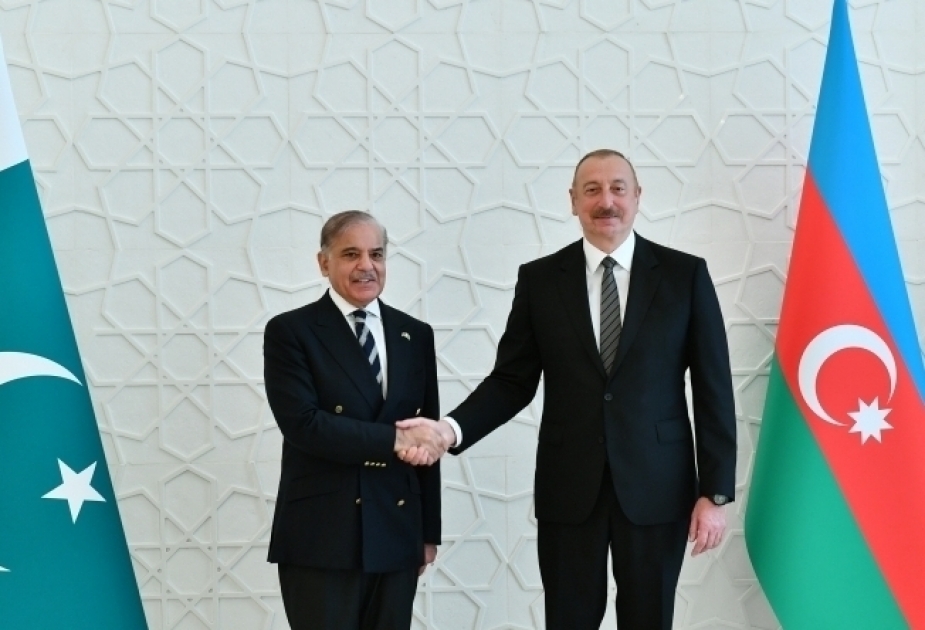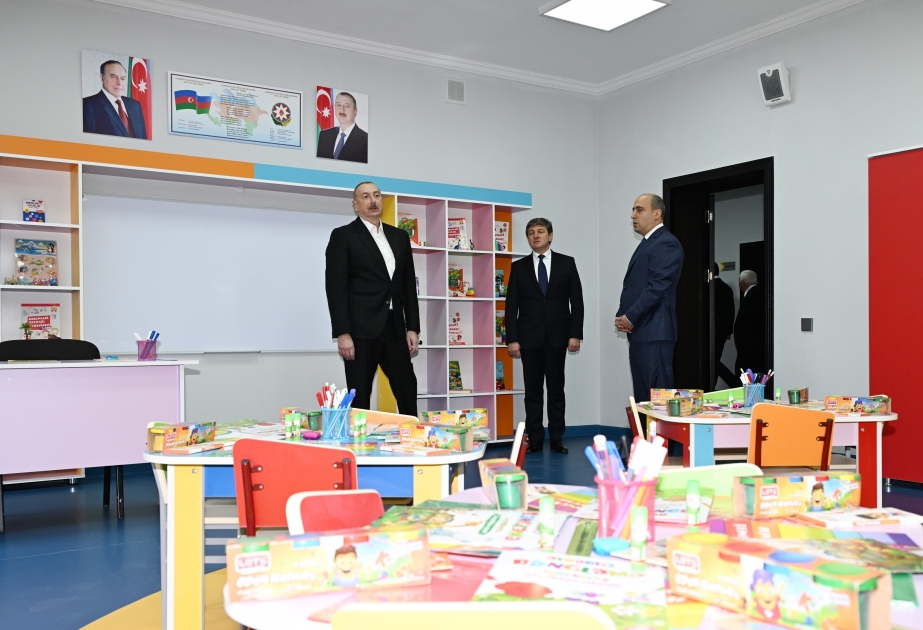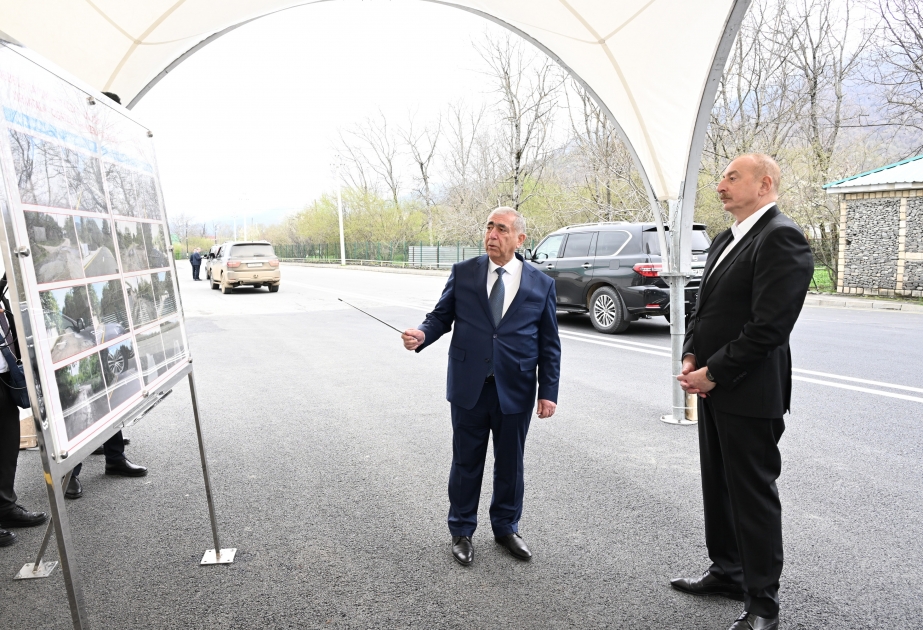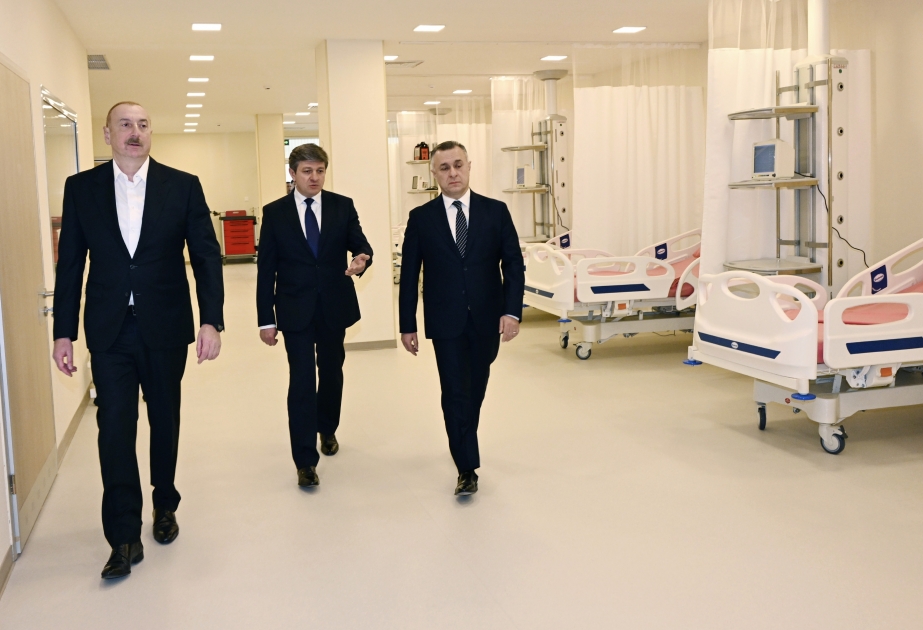OFFICIAL NEWS
President Ilham Aliyev attended conference on development of cotton-growing VIDEO
Saatli, March 28, AZERTAC
A conference on the development of cotton-growing has today been held in Saatli.
President of the Republic of Azerbaijan Ilham Aliyev attended the event.
The head of state made an opening speech at the conference.
Opening speech of President Ilham Aliyev
- At today's meeting, we will discuss issues related to the development of cotton-growing in our country. As you know, the development of cotton-growing is considered a priority sector in Azerbaijan. The first meeting on cotton-growing after a long break was held in the city of Sabirabad last year. This year we are conducting a meeting in the city of Saatli. This year, the largest cotton harvest is expected in Saatli District. Cotton-growing has great benefits for the development of the district. At the same time, we observe rapid development in all districts dealing with cotton-growing.
In previous years, a lot of work was done related to the development of Saatli District. The infrastructure of the district has been completely reconstructed. Electricity supply has significantly improved. The new substation I inaugurated today will provide electricity to both the population and all farms will, of course, opens up opportunities for great development. At the same time, the problems of water supply in Saatli District are being addressed as well. For many years, the population suffered a lot from that. Water was provided only to 30 per cent of the city and for just two to three hours a day. Now drinking water meeting the standards of the World Health Organization is provided on a continuous basis.
According to my information, gasification has reached 80 per cent, and I am sure that no settlement of Saatli will remain without gas in the near future. This is the goal. We will achieve that. We can say that all rural roads of Saatli District are being overhauled and built. Several important rural road projects were implemented in previous years. Today we opened one of them. There is another rural road project connecting several villages. It will also be realized and commissioned in the near future.
The construction of social facilities is well under way. There is a modern hospital, the Olympic center, schools and kindergartens – in other words, the comprehensive development of Saatli District on the basis of a state program is ongoing successfully. The state programs on the socioeconomic development of the regions adopted earlier are being successfully implemented and creating new realities in our country. Our main goal was and still is today, of course, is to implement all infrastructure projects, create a modern infrastructure, solve problems of electricity, gasification, drinking water and land reclamation, build rural and main roads, which will give an impetus to rapid economic and social development. And this is happening. Considering the fact that several state programs on the socioeconomic development of regions have already been implemented, we can see that these programs are of great importance. After the implementation of infrastructure projects, better business conditions were created. The Azerbaijani state pursues a consistent policy in this direction. The development of entrepreneurship, the improvement of the business environment and the exploration of new export markets have led to comprehensive development of our country.
We will continue our successful work in the future. The development of the non-oil sector is a priority, especially in the current conditions when oil prices on global markets have plummeted. Now we will pay more attention to the development of the non-oil sector. In addition, more active work will be carried out.
Cotton-growing has long-standing traditions in Azerbaijan. Our people have been engaged in cotton-growing for centuries, but the most dynamic and successful period for the development of cotton-growing is associated with the name of great leader Heydar Aliyev. It was on his initiative and under his direct leadership that cotton-growing developed rapidly in Azerbaijan in the 1970s and early 1980s. If you look at the statistics, you can see that it was under the great leader that cotton harvests in Azerbaijan increased several times. In the early 1980s, up to 800,000 - 1 million tons of cotton were harvested.
This, of course, contributed to the development of the republic. Employment was high. People engaged in cotton-growing significantly improved their living conditions. Our villages were well maintained. Great investment was attracted to Azerbaijan at the time. Of course, we were not an independent state then. The Azerbaijani people should not forget that Azerbaijan was one of the two republics of the Soviet Union that provided for their needs and simultaneously contributed to the all-union budget. The other 13 republics lived on grants.
I want to note again that cotton-growing has great traditions. Unfortunately, after the departure of the great leader from Azerbaijan to Moscow, we began to experience a decline in cotton production and indeed in all other sectors. Every year, less attention was paid to cotton fields and, unfortunately, this process continued until recent years.
The period of independence. Of course, we remember the first years of independence too well. Those were very difficult years. We experienced a deep political, economic and military crisis. The forces that were in power in the early years of independence led Azerbaijan to death, a civil war was under way, there was massive disobedience and deep crisis. Industry and agriculture were completely ruined. Our traditional cotton-growing and viticulture were in decline. However, after 1993, the situation began to stabilize under the leadership of the great leader. If we look at the statistical indicators, we can see that economic development was observed in Azerbaijan every year since after 1996.
Unfortunately, we failed to achieve the desired result in cotton-growing. This has several reasons. The first reason, of course, is that we did not have sufficient financial resources in the first years of independence. Those present here certainly know that cotton-growing is a sector that requires large investment. At that time, we had no resources. The available resources were spent on the most pressing issues. On the other hand, in the period of independence we were faced with food security problems because there was an all-Union industrial and economic complex in the Soviet Union. Viticulture, cotton-growing, tobacco-growing were developed in Azerbaijan. The production of fruits and vegetables increased. At the same time, we imported food from other republics – Russia, Ukraine, Belarus. So there was a great dependence.
Therefore, first of all, we tried to ensure food security. We have practically managed to ensure that to the maximum extent. Today we provide ourselves with meat by 100 per cent. We provide ourselves with milk, dairy products and poultry by about 80-90 per cent. In Soviet times, it was not the case. We were in a completely dependent position. In the years of independence, the production of fruits and vegetables in Azerbaijan increased several times, and this means a great export potential and great export opportunities for us. Therefore, we have paid more attention to food security issues. Technical vegetation – cotton-growing, tobacco-growing and silkworm breeding – were somewhat overlooked. Unfortunately, it is possible to say that we practically lost these sectors. I must say quite frankly that state support for cotton-growing was very weak.
I believe that the development of cotton-growing is already a reality today. Year 2016 was a turning point. Year 2015 was, one might say, the most unsuccessful in our modern history from the perspective of cotton-growing, as 35,000 tons of cotton were harvested from an area of 18,000 hectares. Last year, in a short time and despite losing some time, we mobilized all our resources and managed to change the situation. Serious measures were taken, equipment was purchased, state support was provided and land reclamation was carried out within the limits of possibilities. Last year, we planted cotton on an area of 51,000 hectares, thus collecting about 90,000 tons of harvest. That is three times more than in 2015.
This year, however, we prepared even harder. All agro-technical activities are organized at the highest level this year. I visited one of the cotton fields of Saatli District today. We have officially launched sowing there. The most modern equipment has been purchased, all necessary equipment, fertilizers and medicines are available. This year, of course, we expect an even higher harvest.
This year and last year, the State Investment Program envisaged large funds for the development of cotton-growing. Comprehensive measures have been taken. First of all, we had to provide ourselves with equipment, and we did that. Thousands of units of new equipment were delivered to Azerbaijan last year and this year. About 100 cotton harvesters were imported last year. More than 200 modern harvesters have been ordered this year.
Reclamation work has been carried out successfully. The Open Joint-Stock Company "Melioration and Water Management", as well as local executive bodies, take an active part in this. Having expanded land reclamation measures, we have engaged new acreage. I think that thanks to all these comprehensive measures, a record result is expected this year. We have significantly expanded the areas under crop. According to the latest data, cotton sowing is expected on 136,000 hectares this year, and the average yield should be at the level of 20 quintals. Compared to the previous year, this represents growth. But cotton-growers and we know well that this is not good enough. In Soviet times, the yield was higher. If we take into account that we acquire modern machinery today and take all other measures at the highest level, the yield should, of course, increase in the coming years.
Cotton-growing is very profitable for the country's economy. It brings currency to our country. Cotton is a product sold on stock exchanges. This is why one does not have to look for markets to sell cotton and fiber, which, of course, is a big advantage. At the same time, cotton-growing is a labor-intensive branch of agriculture. Last year, tens of thousands of people were involved in cotton-growing. This year, this figure will be even higher. Cotton production is very beneficial in terms of increasing employment in the regions. The public and officials of all cotton-growing districts are already well aware and see that people in these districts who want to work but are still unemployed can find work.
Of course, the state is taking measures. I must also note that more than 40,000 people were involved in public work since the beginning of this year alone. More than 40,000 jobs have been created only in the public sector. More than 40,000 people have already been provided with jobs in state companies and local executive bodies. These include repair and construction work and landscaping jobs. We must create new jobs because we must always keep unemployment at a low level. Today, Azerbaijan is considered an exemplary country in terms of dealing with unemployment, because our unemployment rate is at a very low level and should stay there. In some neighboring countries, unemployment is already reaching critical levels. In addition, they are experiencing a demographic crisis. Our population is growing. With the growth of the population, we must also think about new jobs. Population growth is a very positive indicator and a positive process. The population of Azerbaijan is approaching 10 million people. In the near future, this will be a historic achievement for us. At the same time, this poses new challenges. We must always create jobs, so that unemployment stays at a low level. So cotton-growing is very profitable in terms of employment.
Starting from last year, of course, we have been providing the cotton industry with very large state support. Today we are conducting the second meeting related to cotton-growing. This meeting in itself is a testament to state support. At the same time, we have taken very serious measures to stimulate citizens and farmers. Last year, the purchase price of cotton was increased from 41 to 50 gapiks. Besides, a subsidy of 10 gapiks is provided. People receive money on a daily basis. They are already showing great interest in cotton-growing. This is a very important factor. The state provides and will continue to provide its support. We have spent and will continue to spend hundreds of millions of dollars on the development of cotton-growing. But if our people did not show interest in this sector, then our work could remain unfinished. Therefore, state support, the joint activities of all public and private bodies, and public support have brought about a completely different situation. I am sure that the figures will improve this year – there is no doubt about that. Of course, we will develop cotton-growing at an even faster pace in the future. Cotton production will expand further, which will bring great benefit to both our people and the state.
The state always provides assistance to entrepreneurs in Azerbaijan. This assistance is manifested in various spheres. Of course, first of all, my political support is of particular importance. I often meet with entrepreneurs every year, try to resolve their problems and encourage them to invest in the national economy. At the same time, entrepreneurs are provided with great financial support. To date, loans totaling more than 2 billion manats have been granted on preferential terms through the National Fund on Entrepreneurship Support. These loans are provided to the real sector of the economy. Due to these loans, tens of thousands of new jobs, hundreds and thousands of new enterprises have been created. In other words, new opportunities have been opened for the development of the non-oil sector of our country. It is as a result of this that our non-oil industry has increased by 5 per cent and agriculture by more than 3 per cent in two months of this year. This is evidence of the development of the real sector of the economy – non-oil industry and agriculture. The development of the oil industry is regulated by prices. As the oil price rises, this indicator also increases, of course. If oil production increases, this indicator will also increase. If it falls, so does this indicator. So this is not an indicator. The main indicators for us are those reflecting the development of the non-oil sector and agriculture. Both indicators are very positive. I think that ours are the highest indicators in the world. This is also acknowledged by influential international organizations. Among them, the most authoritative forum is the Davos World Economic Forum, according to which the Azerbaijani economy is ranked in 37th place globally in terms of competitiveness. There are more than 200 countries in the world and we are in 37th place by this criterion. I believe that this is a historic achievement. In addition, we have move up three steps compared to last year. Of course, this is a high assessment of our work, and we are very pleased with that. But the main thing is the processes taking place in our country, and these processes are going in a positive direction.
Stability is provided in Azerbaijan. The Azerbaijani people are the guarantor of stability. Azerbaijan stands out with its policy both in the region and the world. Security is provided, public processes are going in a positive direction and civil accord is strengthened. There is rapid economic development and the development of regions in Azerbaijan. We show an example of how to manage a country. We are setting this example and, of course, this policy is approved and supported by our people. This is the main factor for the realization of our plans for the future. The unity of the people and the government is the main factor that determines the successful development of any country.
I am confident that our successful economic policy, the development of the regions, the new initiatives and reforms will ensure sustainable development. Recently, strategic roadmaps have been prepared for many sectors. They have been published. The public already knows this. There are specific programs for each sector, and we are working on the basis of that.
One of the main tasks for the coming years is to increase non-oil exports, because everything goes in a positive direction in the oil and gas industry. Our large project, the Southern Gas Corridor, is being successfully implemented. This is also a historic project. But our main goal is to increase non-oil exports. To do that, we must develop traditional branches of agriculture. It is not only about cotton-growing. Last year, we managed to achieve a serious breakthrough in both tobacco-growing and silkworm breeding. The production of tobacco is increasing. We are already seriously engaged in the exports of dry tobacco. Contracts have been signed. Viticulture is developing at a fast pace. We should increase and are already increasing wine exports. Sericulture is rapidly developing. Whereas in 2015, a little more than 200 kilograms of silkworm were harvested, this figure reached 70 tons last year, while this year it is expected to be even higher. The operation of the Shaki Silk Factory has been restarted. There, too, subsidies are provided. Subsidies are also provided in the tobacco industry. At present, large-scale sowing of sugar beets has begun. This is necessary for us, because our sugar factory works more on imported raw materials. We must provide more local raw materials. And this means employment and export potential. Therefore, the export of non-oil products, in particular agricultural produce, is our main task at the current stage of development.
We are already creating trading houses in a number of countries. The “Made in Azerbaijan” brand has already recognized in the world. Today, the most important issue in all political contacts and meetings with my colleagues is the export of Azerbaijani products. I always raise this issue, and where there is political support, of course, new opportunities open up for our entrepreneurs. Entrepreneurs should also be active. They should access new markets themselves. The Azerbaijani state organizes that. Business forums are conducted. Entrepreneurs are always represented on government delegations. They also need to be proactive, promote their products, try to take advantage of this opportunity and supply their products to foreign markets. Of course, we should provide the domestic market as much as we can, and we are doing that.
In other words, the positive experience we gained in cotton-growing last year gives us good reasons to be optimistic about the future. Today's meeting will discuss important issues related to the development of cotton-growing. I am confident that the sowing campaign that has begun today will be successfully completed and we will gather a rich harvest.
X X X
Other speakers at the event included head of Saatli District Executive Authority Siragaddin Jabbarov, head of Bilasuvar District Executive Authority Mahir Guliyev, Advisor to Gilan agricultural group on cotton-growing of Gilan Holding Bahruz Jamalov, head of Beylagan District Executive Authority Vagif Abdullayev, head of Barda District Executive Authority Vidadi Isayev, acting Director General of CTS Agro LLC Arif Ibrahimov, head of Tartar District Executive Authority Mustagim Mammadov and chairman of the Irrigation and Water Management Open Joint Stock Company Ahmad Ahmadzade.
X X X
President Ilham Aliyev made a closing speech at the conference.
Closing speech of President of the Republic of Azerbaijan Ilham Aliyev
- This year cotton will be sown in 22 districts. According to the latest available data, the area under cultivation will constitute 136,000 hectares. The breakdown of acreage by districts is as follows. I want to voice these figures. Let both the public and the working people know that there are huge opportunities for work here.
In Agjabadi District cotton will be sown on 8,800 hectares, in Agdam on 3,000, in Agdash on 3,000 hectares, in Agsu on 2,500 hectares, in Beylagan on 8,500 hectares, in Barda on 8,500 hectares, in Bilasuvar on 11,000 hectares, in Jalilabad on 500 hectares, in Fizuli on 2,000 hectares, in Goranboy on 5,000 hectares, in Hajigabul on 1,200 hectares, in Imishli on 18,000 hectares, in Kurdamir on 4,000 hectares, in Neftchala on 10,000 hectares, in Saatli on 17,100 hectares, in Sabirabad on 15,000 hectares, in Salyan on 7,000 hectares, in Samukh on 30,000 hectares, in Tartar on 3,000 hectares, in Ujar on 2,500 hectares, in Yevlakh on about 2,000 hectares, in Zardab on 3,100 hectares. This is a good indicator which is three times higher than last year. Of course, we must try to expand the areas under cultivation in the coming years.
The average yield is expected to be around 20 quintals. Of course, it may be more and less. For example, last year it was 17 quintals. Last year, of course, we lost a little time. In addition, the weather conditions were not very favorable. It was noted here that cotton was harvested even in January. But large-scale gathering lasted until December. Of course, this year all the work should be done in a timely manner. All the preparatory work has been carried out in a timely and thorough manner. The sowing has already been launched. Of course, we must carry out the harvesting campaign in a timely manner. If we get an average of 20 quintals per hectare, it would mean the harvesting of 270,000 tons of cotton. If we consider that only 35,000 tons of cotton were harvested in 2015, this is an excellent indicator achieved in a short time. The work done in a short time has led to such an excellent result. This shows that when there is government support and when work is organized correctly, one can achieve everything. It is possible to say that we have already restored cotton growing in Azerbaijan, and we will go only along the path of development in the coming years.
Good working conditions must be created for workers in all the fields. As the acreage is increased, the necessary infrastructure, the measures and the field camps should be organized at the highest level, of course, to make sure that workers are satisfied.
We need to minimize losses both in the fields and on the roads. The roads leading to cotton fields are being overhauled. In general, the repair and construction of rural roads, the laying of new roads in our country have already assumed large proportions. In recent years, we have implemented many projects. This year alone, more than 40 projects linking hundreds of villages are being implemented. In my opening remarks I already noted that one rural road project in Saatli District remains outstanding. After it has been implemented, there will be no unrepaired rural road left. This program is being implemented in all our districts. In the current and next year, major funds have been and will be allocated for this. We link villages. This provides great convenience for the people. At the same time, we build roads to the key sowing areas to avoid losses and reduce fuel consumption, so that farmers could deliver products to markets or processing enterprises in a short time.
Continuous power supply should be provided at reception stations and at ginneries. At the same time, power should be continuously supplied to pump stations. Looking at the example of the new substation I inaugurated in Saatli today, we can see a renewed energy infrastructure. In all the regions we are building substations. New lines are laid and pylons changed. In other words, continuous power supply is essential both for the population and the economy. In particular, continuous power supply of the cotton-growing process is of great importance. Last year, this work was done at a good level and it should be provided at the highest level this year as well.
Taking into account the expansion of acreage, more than 200,000 people are and will be provided with jobs in the field of cotton production this year. Last year this figure was 64,000. This means that employment opportunities here are three times as high. Of course, this will increase employment and reduce unemployment. People interested in working will be able to find a job.
I already noted that the price of cotton was increased by 9 gapiks last year. In addition, a subsidy of 10 gapiks is paid. This shows once again that the state attaches great importance to this sector. At the same time, this indicates that, in general, the state provides farmers with tangible support. I think there are no such conditions for farmers in any other country. Our farmers are exempt from all taxes except for the land tax. The incentive mechanism for both investment and export is already in place. This gives farmers additional incentive and creates additional opportunities for them. Today, all the main branches of agriculture, including cotton-growing, are subsidized.
Fertilizers are provided on favorable terms. Farmers pay only for 30 per cent of the fertilizer cost. Fuel and loans are provided on preferential terms as well. I have already mentioned that the lowest-interest loans worth 2 billion manats have been allocated to the real sector of the economy. These funds mostly go to the regions. Methodical guidance is provided, rural and main roads are built. so all of these infrastructure projects, all this represents help and tremendous financial support provided by the state. We are doing this for people to live even better, so that farmers and working citizens could earn more and improve their standard of living. This year, 200,000 new have been opened in 22 cotton-growing districts alone, and this figure will increase further in the coming years. Therefore, all relevant agencies need to analyze the policy associated with our future human resources in general and make suggestions.
I have already noted that thanks to successful economic policy, stability and tranquility, the population of Azerbaijan is growing and will continue to grow. We must rationally use labor resources. Measures are being taken to create new jobs. At the same time, in connection with the jobs to be created, we must mobilize labor resources so that there is not a gap or shortage of manpower here. At the same time, unemployment should not grow. Therefore, it is necessary to pursue a very thoughtful policy. In particular, it is necessary to take into account the rapidly growing jobs in the cotton-growing sector.
Issues of personnel training are of great importance. In general, vocational training in Azerbaijan should assume large proportions. There is a great need for that. A process of creating vocational schools is under way. It should go even faster. This process should be linked to the overall development of the economy. We plan our economic development. Our regional development programs are published. We prepare a five-year plan of activity. At the same time, we are shown the way by the programs related to industry, agriculture and other branches. So professional training should be conducted in accordance with this. How many professional schools are needed and what direction should they focus on? There is a great need for vocational schools specializing in agriculture, industry and tourism, because these areas will continue to develop fast in Azerbaijan.
It is necessary to train personnel in agricultural specialties, such as agronomists. As far as I know, there is a certain shortage of that. We should involve young people in this sphere and stimulate it, so that it knows that professionalism will significantly improve their standard of living. Work in this direction was carried out last year and will be continued in the current year as well.
Pivot irrigation systems have been imported to our country. In previous years, private businesses used these systems in some districts. We cannot be content with their number, of course. Therefore, the government has started to provide support for this sphere. Pivot systems are the most modern and effective irrigation systems. They can increase yield several times. These systems are and will be used in Azerbaijan – of course, not only in cotton-growing, but also in other sectors. These systems will create a big turnaround. As yield increases, farmers and the state will benefit, of course.
Considering the fact that we have major plans associated with the development of agriculture, in particular, irrigation and land reclamation, we should produce pivot irrigation systems ourselves. I know that such an initiative has already been put forward. It must be supported. Government agencies should provide support, so that we could provide ourselves with pivot systems soon.
In general, the major funds allocated to the field of land reclamation in the past and recent years are already yielding results. In recent years, we have created four large water reservoirs. The largest of these are Takhtakorpu and Shamkirchay water reservoirs. Also, the water reservoirs of Goytapa and Tovuzchay have been put into operation. As a result, tens of thousands of hectares of new lands are now in circulation. The entire work is being done now. Work in this direction should be continued. A very serious program of actions is being prepared in relation to irrigation. Of course, the cleaning of canals, the construction of new canals and pivot systems on the sown areas are of great importance.
At the same time, it is very important to create a pesticide production plant in our country. We buy pesticides abroad. We can arrange this in the country, so that the currency does not go abroad. As you know, a large fertilizer plant is under construction in our country. It will begin to operate next year, and we will fully provide ourselves with nitrogen fertilizer and export it abroad. It is also necessary to establish a pesticide plant.
I have already talked about this at the previous meeting and I want to reiterate that we will need new cotton gins in a few years. It was said here that a new plant is to be built in Imishli. But we should link the construction of plants with the predicted harvesting of cotton. I have been informed that we have only 22 plants with a processing capacity of 400,000 tons. In Soviet times, the processing capacity of these plants was 900,000 tons. Many of these plants are already inactive and there are 22 plants. If we develop cotton growing at the given rate, then we will reach 400,000 tons in about a year or two. Therefore, it is necessary to do all the work now. The Ministry of Economy, the National Fund for Entrepreneurial Support, the Ministry of Agriculture and private bodies should work and inform me. We should waste no time.
As a result of the measures taken this year, water supply to rain-fed lands of 150,000 hectares will be ensured. I see this as a historic achievement. The provision of water to such a large number of land plots is a great achievement indeed. We resolved this issue very quickly, in a short period of time. We achieved this both through the "Melioration and Water Management" Joint Stock Company and as a result of the activities of local executive bodies. A significant portion of these 150,000 hectares is intended for cotton-growing. Of course, if we hadn’t done that, we could not talk about today's figures.
We must continue this work. I have already received proposals for the next year. According to preliminary estimates, we can provide water to an additional 90,000 hectares of land next year. Work in this direction is already beginning. This should definitely be included in the State Investment Program. We still have unallocated resources. We can add funds this year too, so that water is available for next year’s sowing season.
Of course, we are not setting ourselves major goals. Twenty quintals per hectare, of course, is a very low indicator. I was told that the cotton field I visited today would provide 40 quintals. It was noted here that some farms collected 50 quintals. These, of course, are good indicators. In Soviet times, the average yield was 30-35 quintals. So we must strive for this. In fact, there were no modern irrigation systems, modern tractors and harvesters at that time. So it is possible. We need to expand the areas under crop and also increase the yield.
Last year, about 90,000 tons of cotton were harvested from about 51,000 hectares. As I have already mentioned, 270 thousand tons are expected from 136,000 hectares, maybe even more. But I do not want to set a goal or a plan. Of course, life, natural conditions and the weather will show. This also plays a big role. But we need to know the real possibilities and try to do the work more efficiently.
According to the information available to me, it is easy to collect 35-40 quintals of cotton per hectare with the aid of the pivot irrigation. I think that a figure of 25 quintals is quite realistic with open irrigation. I think that in 2020, through open irrigation, we can plant cotton on an area of 140,000 hectares, while approximately 60,000-65,000 hectares can be provided with pivot systems. If we achieve that, the average yield will reach 30 quintals, which means harvesting of 600,000 tons of cotton per year. These are realistic figures. To achieve these figures, the state will do what it is supposed to do, allocate as much as necessary, this will be provided for in the State Investment Program, additional equipment will be purchased and new canals will be laid. The workers, farmers and local executive authorities should simply be prepared for that. I am announcing these figures today so that you are ready for them, not because I am setting a plan. No, those days are already gone. We must plan everything correctly. In this case, the result will be even better. As a result, we can grow cotton on an area of 200,000 hectares. These jobs will benefit 300,000 people daily.
I want to voice some figures concerning equipment, so that you and the public of Azerbaijan could know. Last year, 1,800 units of equipment were purchased, including 94 cotton harvesters and about 300 tractors. This year, 3,811 units of equipment have been ordered, including 209 cotton harvesters and 810 tractors. $150 million was spent to purchase this equipment last year and this year. This is just one sign of the real attention the state is paying to cotton-growing. If we add to this the equipment, reclamation work and other necessary measures, we can see how much attention we are paying to this only for people to live even better.
Of course, the development of cotton-growing will bring additional revenues to our country. But I want you to know that these revenues cannot be compared to those from oil. The sale of oil fetches billions of dollars in currency. If oil prices are at the level of $40 this year – this figure is provided in our budget – our country will receive currency of more than $5 billion. Therefore, cotton-growing is being developed primarily to increase employment and improve the living standards of people in these districts. We are investing our oil money in this sector, so that people could live even better, work and earn their living by honest work. We are creating opportunities for good incomes. Therefore, the development of cotton-growing for me as President is, first of all, a social, then an economic project and only then a project that brings currency.
Whoever grows cotton earns, of course. The state is interested in more currency coming into the country. But it would be wrong to compare this with oil and gas, of course. Therefore, as a result of the acquisition of this equipment, both the yields and the volume of output will grow, of course.
I want to mention one more issue. I was informed that about 50 per cent of cotton was collected manually and 50 per cent with the help of technology last year. Of course, the use of equipment is more effective and more beneficial to companies. However, I believe that we should first of all take into account the social factor in this sphere. If people want to collect cotton manually and more people can be involved in that, it is necessary to create conditions for this work to be done manually as far as possible because in the case of manual collection, it is people who earn money, while when harvesting machinery is involved, it is mainly companies that earn money. I am interested in people working in cotton-growing bringing money to their homes every day. Therefore, it is necessary to create conditions. I know that people in some places even said last year that equipment should not be engaged, protested against this and wanted to collect cotton themselves. It was said here that people collected the cotton that opened after the rain in January. Why? Because it brings an income! This should be the case this year too. It is necessary to ensure that, as far as possible, the collection is done manually and equipment is used only in the absence of such opportunities. It will be fair.
The development of cotton-growing will give a major impetus to the development of light industry in Azerbaijan, of course. Last year, the foundation of an industrial park was laid in Mingachevir. Nine plants will be built there, including a spinning mill. The first plants should begin to operate before the end of this year. This is also a major and serious economic initiative. As a result of the operation of these nine plants and the industrial park as a whole, at least 5,000 people will be provided with jobs. For a city like Mingachevir, this is an excellent indicator. As you know, unemployment is higher in some cities than in rural areas. Therefore, the establishment of the Mingachevir Industrial Park is of great importance from this point of view.
At the same time, we will sell finished products, not yarn not fiber. We must try to sell ready-made products, textiles, to access foreign markets. I want to say again that in my contacts with colleagues, I raise this issue to the fore. I raise the issues of increasing the turnover and exports of Azerbaijani products, so that new markets open up for us. There are traditional markets, and we work with them. We must access new markets. This is the goal behind the creation of trading houses. I have already noted this and want to repeat: our trade missions will begin to function in Russia, Belarus, Ukraine, China and the United Arab Emirates in the near future. I believe that these are the main markets for us at this stage. At the same time, we should also access the markets of the European Union, and do that more broadly. We do export there now, but I think not at the proper level. We are working in this direction.
To fulfill all these instructions, we should work very hard in the next few months. Local executive bodies have a serious task to meet. They also worked well last year in a short time because we were a bit late last year. In addition, the weather conditions and rains did not allow us to do the job properly. Despite this, we picked a good harvest last year. They should organize this work at the proper level this year too. As I have already noted, it is necessary to rationally use labor resources. As for the equipment, I am sure that there will be no problems. The equipment will be engaged on the field in a timely manner. Procurement companies should work closely with local executive bodies. Our central and local bodies must also interact. The Ministry of Economy, the Ministry of Agriculture, the "Melioration and Water Management" Joint Stock Company, representatives of local executive bodies should all work together. General administration and coordination issues are entrusted to the Presidential Administration. Last year, I tasked the Administration of the President and they worked well on its implementation. So it will be this year as well. I am confident that due to the ongoing and forthcoming work, we will get good results in cotton-growing this year too.
I hope you have a good harvest. Thank you.

